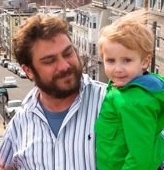Interview with Langdon White
Re-thinking Linux Distributions. ... separate the operating system from the content

Langdon White will give a talk about Re-thinking Linux Distributions. ... separate the operating system from the content at FOSDEM 2016.
Q: Could you briefly introduce yourself?
I have 20 years experience working in the software world, most of that time spent in consulting. I have had jobs ranging from programmer to architect to VP of engineering. I am really excited about the direction of computing the past few years allowing us to develop systems that are more resilient and reliable through models like DevOps, microservices, and the perpetual beta. The reinvigoration of the AI space is also really exciting. However, at the end of the day, I just want software to simplify and improve the lives of individuals. I believe in open source for two main reasons: first, because it helps to make all software available to everyone, and second, because it allows us all to “stand on the shoulders of giants.”
Q: What will your talk be about, exactly? Why this topic?
A lot has changed in the software world since the advent of the Linux Distribution. I believe that many of the implementation choices for distros are holding back Linux and the advancement of software in general. My talk is meant to point out some of the challenges distros are designed to solve and propose some other solutions. Please see the abstract of my talk for more details (or come to the talk! :) ).
Q: What do you hope to accomplish by giving this talk? What do you expect?
I want to accomplish two things. First, I would like to convince distro maintainers that there are other ways of ensuring the quality of an installed operating system than traditional packaging techniques. Second, I would like to convince application developers that the best development and deployment experience they can have is on Linux. However, what I really want, is for both groups to participate in the work so that we can all work together to deliver a “product” that meets all our needs.
Q: What are the biggest challenges for software developers concerning packaging on Linux distributions?
Simply that packaging is not a part of their “day jobs.” In other words, to package an application for any Linux Distribution, a developer needs to learn a new “language,” map their language dependencies to packages, and create a special build environment to deliver the package(s). Not to mention, they likely will have to repeat those steps if they want to deliver to more than one distribution. On top of that, they have to redo it every time they want to release an upgrade or deliver a fix. Usually, that gap between those events is also just long enough for the developer to have forgotten most of what they learned the last time around.
Q: How are Fedora, CentOS and Red Hat Enterprise Linux addressing these challenges of packaging for developers?
Right now, I think we have identified a lot of the issues for application developers. We have also been working on identifying all of the benefits that packaging provides. Now that we have identified those two sets of things we are working on how to solve those challenges without losing the benefits of packaging. I think it is really important to point out that packaging, packaging guidelines, packaging review processes , and their impacts on timely updates and distribution of binaries are incredibly beneficial for software applications. The goal here is not to lose that, just to make it more accessible to application developers and provide end users with greater flexibility in their application choices. I have a “how to get involved slide” in my talk and I hope people will follow up.
Q: Have you enjoyed previous FOSDEM editions?
Yes, very much. I find FOSDEM, DevConf.cz, and Fedora Flock incredibly invigorating about the future of software and open source. I am not quite sure how I would stay inspired without attending them.

Creative Commons License
This interview is licensed under a Creative Commons Attribution 2.0 Belgium License.